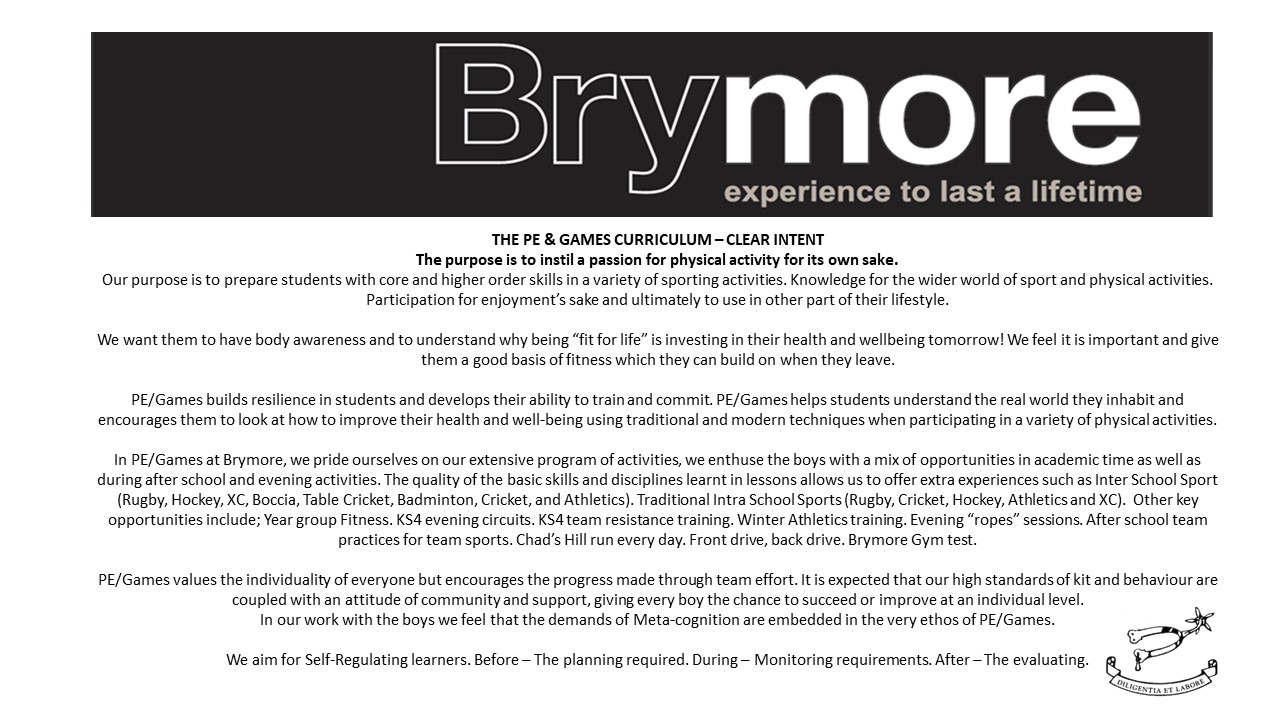Sport is at the heart of what makes Brymore Academy special.
We have a strong philosophy that every boy should be active, fit and healthy to achieve his best. Boys are encouraged to run Chad’s Hill at least once a week and take part in fitness, circuits and other activities in the evenings.
THE PE & GAMES INTENT
The purpose is instil a passion for physical activity for its own sake.
Our purpose is to prepare students with core and higher order skills in a variety of sporting activities. Knowledge for the wider world of sport and physical activities. Participation for enjoyment’s sake and ultimately to use in other part of their lifestyle.
We want them to have body awareness and to understand why being “fit for life” is investing in their health and wellbeing tomorrow! We feel it is important and give them a good basis of fitness which they can build on when they leave.
PE/Games builds resilience in students and develops their ability to train and commit. PE/Games helps students understand the real world they inhabit and encourages them to look at how to improve their health and well-being using traditional and modern techniques when participating in a variety of physical activities.
In PE/Games at Brymore, we pride ourselves on our extensive program of activities, we enthuse the boys with a mix of opportunities in academic time as well as during after school and evening activities. The quality of the basic skills and disciplines learnt in lessons allows us to offer extra experiences such as Inter School Sport (Rugby, Hockey, XC, Boccia, Table Cricket, Badminton, Cricket, and Athletics). Traditional Intra School Sports (Rugby, Cricket, Hockey, Athletics and XC). Other key opportunities include; Year group Fitness. KS4 evening circuits. KS4 team resistance training. Winter Athletics training. Evening “ropes” sessions. After school team practices for team sports. Chad’s Hill run every day, Front drive, back drive and the Brymore Gym test.
PE/Games values the individuality of everyone but encourages the progress made through team effort. It is expected that our high standards of kit and behaviour are coupled with an attitude of community and support, giving every boy the chance to succeed or improve at an individual level.
In Key Stage 3 PE and Games we look to work through concepts; Personal best, Skills, Leadership, Activity/Participation, Cognitive and Social. As the boys go through Key Stage 3 they will look at these concepts in increasingly more and more depth.
In Key Stage 4 we still use these concepts, however in Yr 10 and early Yr 11 some lessons are used to support those doing Sport Studies. When this isn’t required, Key Stage 4 is about choice, fun, and enjoyment.
EXAM: OCR Cambridge Nationals – Level1/Level 2 Sport Studies
Core Units
Sport Studies Unit R051: Contemporary issues in sport (EXAM)
It is often said that sport is a reflection of society and, as such, many of the broad issues which affect society are also prevalent in sport. For the same reasons, sport can also be a force for good at local, national and international levels, because of its ability to bring people together.
Learners will explore a range of topical and contemporary issues in sport, relating to participation levels and barriers, the promotion of values and ethical behaviour through sport and the role of high-profile sporting events and national governing bodies in advancing sports’ attempts to positively impact upon society and showcase their worth beyond providing entertainment.
Sport Studies Unit R052: Developing sports skills (Coursework and practical assessment)
While becoming an elite sports performer is a dream which not everyone is able to realise, many of those who are involved in sport and the sports and leisure industries in different roles (e.g. Physical Education teachers, sports officials, roles within national governing bodies, sports facility management) enter into these roles because they developed an interest in sport and physical activity through performing. Participation in sport and physical activity provides young people with a range of transferable skills. They can learn to work both independently and as part of a team; to communicate with team mates, or to an audience through performance; to perform under pressure; to use initiative to solve problems and make decisions considering rapidly changing conditions around them.
Learners will develop their skills, techniques and use of tactics/strategies/ compositional ideas in both an individual and a team sporting activity, as well as their understanding of the rules to allow them to act in a number of officiating roles within an activity. They will also consider the use of different practice methods in order to improve their performance. The unit builds upon the core themes of the National Curriculum for Physical Education in Key Stages 3 and 4 and offers learners the opportunity to refine and showcase skills developed as part of that programme of study.
“Optional” specialist units (Pre-selected to suit Brymore Academy’s provision and resources).
Sport Studies Unit R053: Sports leadership (Coursework and practical assessment)
Whether voluntary or professional, the role of the sport leader is imperative in any sport; adopting the role of coach, manager, teacher or team captain, sport leaders can shape the development of sport by influencing and inspiring those around them to participate and perform in sporting activities.
Learners will develop some of the knowledge, understanding and practical skills required to be an effective sport leader and plan, deliver and review safe and effective sporting activity sessions themselves. They will be encouraged to consider and evaluate their delivery and by doing so develop their ability to communicate with an audience verbally and through practical demonstration, and adapt to developing situations and the different needs and abilities of those they are leading.
Sport Studies Unit R056: Developing knowledge and skills in outdoor activities (Coursework and practical assessment)
Outdoor activities are group or individual activities that take place in a natural, outdoor environment and can vary from hillwalking through the Lake District to BASE jumping from the top of a rollercoaster in Thorpe Park. These activities usually involve meticulous planning and preparation and enable participants to develop skills that are useful and transferable in everyday life. For this reason, organisations increasingly use outdoor and adventurous activities as the basis for team away-days and team building exercises, requiring individuals to work collaboratively and develop their problem-solving and communication skills as a group.
Learners will know about the range of outdoor activities that are available in the UK and be able to identify organisations that provide access to these activities. They will also be able to appreciate the reasons why people become involved in these activities and the risks they face when participating. Learners will consider how to plan an outdoor activity and be able to participate in one. They will gain an understanding of health and safety and risk assessments in outdoor scenarios, of detailed planning for a group activity with multiple variables, and they will develop their communication, decision making and leadership skills in challenging scenarios and environments.





